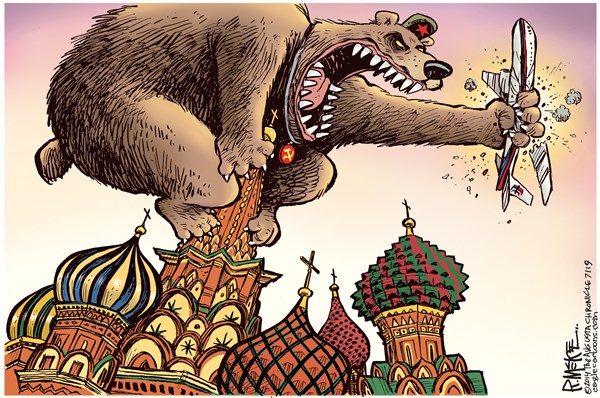America and Russia: The Crisis of 1962
We're alive because American voters put their faith in John Fitzgerald Kennedy, a president who felt a sense of responsibility not only before the American people, but also before the entire planet. Back then, the world balanced precariously on the brink of a full-scale nuclear war between the U.S. and the Soviet Union. One lurch forward would have meant the end of everything, the apocalypse, the very one the Bible warned us about.
It's frightening to think what could have happened to us all had Eisenhower's vice president, Richard Nixon, defeated John F. Kennedy in the 1960 presidential race. It's not at all a given that the Republican candidate would have been able to rise to the occasion and adequately respond to the Caribbean crisis. This is just a hypothetical situation, but after all, 10 years after the Cuban missile crisis, Nixon was embroiled in the Watergate scandal. His political career ended with a forced resignation and the threat of impeachment. "Our long national nightmare is over," said Nixon's successor and former vice president, Gerald Ford.
It's frightening to think that a person who – due to moral and administrative shortcomings – gave himself license to violate the Constitution in such a flagrant way, might not have been able to save the world from destruction during the days of the Cuban missile crisis. The president's morals do matter, after all. His belief in God or lack thereof, his possession of principles that allow him to follow the Constitution unwaveringly and be its keeper and defender – all of these things hold a great deal of significance. Richard Nixon was devoid of these indispensable qualities – qualities that are absolutely necessary for a president of the United States.
Like any conservative, Nixon was preoccupied with tradition and relied on the past to give him answers to today's questions. But in those days, the American people and people all over the world were faced with challenges that had never been encountered before and that simply could not be solved using the formulas of the past. These formulas dictated that war was the answer, not peace. But this time, the world needed peace.
The world needed people whose gaze was fixed on the future. Kennedy was just the person to meet the challenge of negotiating with the USSR. He and his Soviet counterpart, Nikita Khrushchev, became the saviors of the human race.
Kennedy was the first American president to become wildly popular in the Soviet Union. Russian politicians respected him and Russian women fawned over him. The Democratic candidate centered his campaign around the idea of "new frontiers." After all, the Space Age was just beginning; man got his first glimpse of the Earth from space and was taken aback by how small and beautiful it seemed, as well as how fragile it was and how easily it could be destroyed by immoral, unskilled politicians.
More than 50 years have passed since the Cuban missile crisis. Now it seems like a far-away episode of the past that has little instructive value for the present. But in fact, it's quite the opposite.
The experience of the Cuban missile crisis teaches us to have a sense of responsibility before the entire planet – not just Russians or Americans – and to always keep the future in mind, rather than looking for the answer in cold wars. It teaches us to be dedicated to the cause of preserving peace and to look for new solutions to face history's new challenges. It also teaches us that politicians must always adhere to certain moral principles, and have faith in the future while building it for future generations. It teaches us the importance of cooperation and healthy relations between the great peoples of Russia and the United States of America.
A few decades after the Cuban missile crisis, new leaders have picked up the baton of U.S.-Russian relations. They have the ability to solve some of the world's most pressing problems, provide for world peace and maintain the balance of powers that is necessary for international stability. They should do this by building a new world in which the U.S. works together with a rejuvenated Russia to find peaceful solutions to the situations in Iran and Syria – and Godspeed to them.

